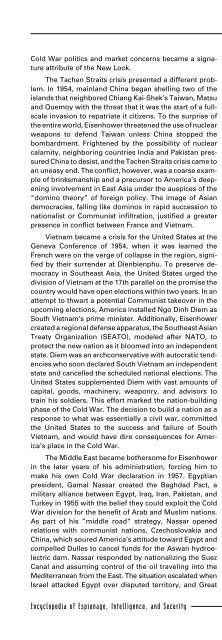ENCYCLOPEDIA OF Espionage, Intelligence, and Security Volume ...
ENCYCLOPEDIA OF Espionage, Intelligence, and Security Volume ...
ENCYCLOPEDIA OF Espionage, Intelligence, and Security Volume ...
You also want an ePaper? Increase the reach of your titles
YUMPU automatically turns print PDFs into web optimized ePapers that Google loves.
Cold WarCold War politics <strong>and</strong> market concerns became a signatureattribute of the New Look.The Tachen Straits crisis presented a different problem.In 1954, mainl<strong>and</strong> China began shelling two of theisl<strong>and</strong>s that neighbored Chiang Kai-Shek’s Taiwan, Matsu<strong>and</strong> Quemoy with the threat that it was the start of a fullscaleinvasion to repatriate it citizens. To the surprise ofthe entire world, Eisenhower threatened the use of nuclearweapons to defend Taiwan unless China stopped thebombardment. Frightened by the possibility of nuclearcalamity, neighboring countries India <strong>and</strong> Pakistan pressuredChina to desist, <strong>and</strong> the Tachen Straits crisis came toan uneasy end. The conflict, however, was a coarse exampleof brinksmanship <strong>and</strong> a precursor to America’s deepeninginvolvement in East Asia under the auspices of the“domino theory” of foreign policy. The image of Asi<strong>and</strong>emocracies, falling like dominos in rapid succession tonationalist or Communist infiltration, justified a greaterpresence in conflict between France <strong>and</strong> Vietnam.Vietnam became a crisis for the United States at theGeneva Conference of 1954, when it was learned theFrench were on the verge of collapse in the region, signifiedby their surrender at Dienbienphu. To preserve democracyin Southeast Asia, the United States urged thedivision of Vietnam at the 17th parallel on the promise thecountry would have open elections within two years. In anattempt to thwart a potential Communist takeover in theupcoming elections, America installed Ngo Dinh Diem asSouth Vietnam’s prime minister. Additionally, Eisenhowercreated a regional defense apparatus, the Southeast AsianTreaty Organization (SEATO), modeled after NATO, toprotect the new nation as it bloomed into an independentstate. Diem was an archconservative with autocratic tendencieswho soon declared South Vietnam an independentstate <strong>and</strong> cancelled the scheduled national elections. TheUnited States supplemented Diem with vast amounts ofcapital, goods, machinery, weaponry, <strong>and</strong> advisors totrain his soldiers. This effort marked the nation-buildingphase of the Cold War. The decision to build a nation as aresponse to what was essentially a civil war, committedthe United States to the success <strong>and</strong> failure of SouthVietnam, <strong>and</strong> would have dire consequences for America’splace in the Cold War.The Middle East became bothersome for Eisenhowerin the later years of his administration, forcing him tomake his own Cold War declaration in 1957. Egyptianpresident, Gamal Nassar created the Baghdad Pact, amilitary alliance between Egypt, Iraq, Iran, Pakistan, <strong>and</strong>Turkey in 1955 with the belief they could exploit the ColdWar division for the benefit of Arab <strong>and</strong> Muslim nations.As part of his ”middle road“ strategy, Nassar openedrelations with communist nations, Czechoslovakia <strong>and</strong>China, which soured America’s attitude toward Egypt <strong>and</strong>compelled Dulles to cancel funds for the Aswan hydroelectricdam. Nassar responded by nationalizing the SuezCanal <strong>and</strong> assuming control of the oil traveling into theMediterranean from the East. The situation escalated whenIsrael attacked Egypt over disputed territory, <strong>and</strong> GreatEncyclopedia of <strong>Espionage</strong>, <strong>Intelligence</strong>, <strong>and</strong> <strong>Security</strong>Britain <strong>and</strong> France took that as an opening to seize theSuez Canal. The conflict placed the world oil trade <strong>and</strong>Middle Eastern stability in jeopardy, <strong>and</strong> forced Eisenhowerto pressure the European nations to relinquishcontrol of the canal. Although resolved, the specter ofSoviet influence in the oil-bearing region forced Eisenhowerto take a stronger st<strong>and</strong> in the Middle East. Theconcern culminated in the ”Eisenhower Doctrine,“ whichheld that the United States defend any Middle Easternnation against communism. Eisenhower invoked the doctrineonly twice, in the Jordanian uprising that spring <strong>and</strong>Lebanon in 1958, but it set precedence for future presidentsLyndon Johnson, Richard Nixon, <strong>and</strong> Jimmy Carter.By the end of his term as president, Eisenhower facedironic opposition. His administration privileged modernization,<strong>and</strong> ended under the suspicion of technologicalbackwardness. Eisenhower created the National Aeronautics<strong>and</strong> Space Administration (NASA), <strong>and</strong> began America’sreach for the heavens. The Russian launch of Sputnik,the unmanned satellite in late 1957, <strong>and</strong> the downing ofthe American U2 surveillance plane in 1960, dem<strong>and</strong>ed agreater investment in science <strong>and</strong> technology. John F.Kennedy drew upon this anxiety when he argued thatAmerica lagged behind the Soviet Union in missile production.The Missile Gap critique helped Kennedy capturethe White House, but it also placed unrealistic burdens onthe way he <strong>and</strong> his successor Lyndon B. Johnson conductedthe Cold War.In the 1960s, the Vietnam conflict pervaded America’sCold War politics. The decade began with President Kennedysuffering profound Cold War failures, the failedattempted overthrow of Cuba’s Communist leader FidelCastro at the Bay of Pigs, the CIA-sponsored assassinationof Congolese Prime Minister Patrice Lumumba, the CubanMissile Crisis, <strong>and</strong> the construction of the Berlin Wall.Needing to silence critics, Kennedy decided to take a morerigid st<strong>and</strong> against the Communists in South Vietnam.With Diem’s popularity at a nadir due to his oppressivepolicies, Kennedy signed off on a plan to deposehim. During the junta, however, the operatives assassinatedDiem, foreshadowing Kennedy’s own murder threeweeks later.When Lyndon B. Johnson assumed the presidency,he inherited the burden of not losing the Cold War inVietnam. Weighted by fluctuations in the civil rights movement<strong>and</strong> burgeoning antiwar sentiment, Johnson acceleratedboth nation building in South Vietnam <strong>and</strong> militaryresistance to Communists. The entire conflict, <strong>and</strong> tosome degree American prestige, came crashing to theground in 1968 when Communist forces launched a massiveattack against American <strong>and</strong> South Vietnamese forcesin the major cities. Although the siege only had temporarysuccess, it had a leveling effect on domestic sentiment.Cold War arguments carried less significance <strong>and</strong> thetrouble became finding a way out. That responsibility fellto Richard Nixon who inherited the Vietnam <strong>and</strong> the ColdWar in 1969.237







![The Big Lie 9-11 and Government Complicity in Mass Murder [PDF]](https://img.yumpu.com/50957077/1/190x245/the-big-lie-9-11-and-government-complicity-in-mass-murder-pdf.jpg?quality=85)








